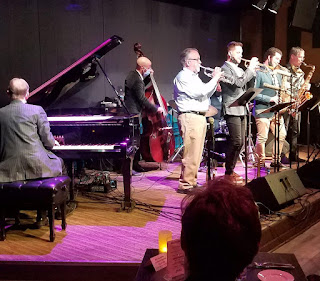Tales out of school: IU Jazz Faculty teaches and preaches in rare club gig
Led by a grateful John Raymond, a septet of Bloomington-based jazz musicians stoked the fires of post-pandemic hopefulness with a scintillating show Friday at the Jazz Kitchen.
 |
| IU jazz faculty ensemble lets itself go at the Jazz Kitchen. |
The trumpeter mentioned to the first-set audience that altered teaching has been virtually the Indiana University jazz faculty's sole outlet for about a year as gigs dried up with the sudden decline of public music-making a year ago.
The ensemble, every one of whose members is an adept soloist as well, delivered a program in which energy and cohesiveness proved thoroughly compatible. A plethora of original charts helped present an impressive profile of the IU program, and the delivery was close to impeccable.
I liked the leader's "North," with its suggestion of hard-working idealism that gathered intensity in Greg Ward's alto solo. That set up ensemble vigor that may have become overloaded when Raymond moved into the spotlight. He adopted a Hubbardesque excess of the sort that many find irresistible from qualified trumpeters. And why not project that maestro's exuberant style in his very hometown? But to me it risked distorting Raymond's own compositional prowess.
Wayne Wallace, who couldn't be present for this engagement, was conspicuous as composer. The first piece, whose title I didn't catch, showed how expertly the group can coalesce around a solo in progress and point a path forward. A kind of robust interlude in unison, with two trumpets and two saxophones in the front line, followed a snare-drum fusillade by Sean Dobbins. That led to a powerhouse solo by the pianist, Luke Gillespie, who widened his comfort zone by channeling his inner McCoy Tyner in a second solo. The theme returned in full cry for a final statement.
Wallace was later represented by a more lyrical number, "Night Air," which featured a fine trumpet-flugelhorn dialogue between Pat Harbison and Raymond. There was also a defining solo by saxophonist Tom Walsh, who put lots of expressive space into his display, giving everyone time to feel what he was getting at and how cogent the message was. Bassist Christian Dillingham helped establish the nocturnal atmosphere by exploiting the mellow side of the electric bass.
Brent Wallarab, a well-known faculty member hereabouts as co-leader of the Buselli-Wallarab Jazz Orchestra, was also away from this engagement, but he showed up as a composer with the ballad "Creature Comfort." The arrangement had a fine balance of solo work and ensemble support, and good solos by Raymond and Gillespie, who was more rhapsodic this time around. (University teachers of jazz, I assume, have to be somewhat like musical magpies to be effective with students and at home in a wide range of styles.)
Wayne Shorter's "Angola" was the one time in the first set when the band ventured outside the IU orbit. It attained white heat in solo exchanges between altoist Ward and tenorman Walsh, set up by Dobbins' tom-tom-heavy solo. Ward also got exhibition space as a composer, with a driving piece (trumpeters tacet) that recalled Billy Strayhorn's "U.M.M.G," a memorable showcase for Dizzy Gillespie long ago on the Duke Ellington album "Jazz Party." Mind you, I'm not calling this plagiarism; I'm calling it inspiration. "Edgewater" seems like an inspired kissing cousin to "U.M.M.G," which I've loved for about 60 years.
Luke Gillespie's hard-hitting solo drew applause midway through — a rare occurrence for any jazzman who doesn't happen to be a drummer. And the veteran pianist, who is well-represented on CDs under his name, got pride of place as the band ended the set with his stirring, anthemic "Blues for All," featuring a richly harmonized theme in four horn voices.
Harbison, a sage on the IU jazz mountaintop, distinguished the performance with a wise and witty solo. Drummer Dobbins was all smiles after the first chorus; so was I. The ensemble re-entered with some stormy simultaneous improvising before everything dwindled effectively to a few well-considered phrases from Dillingham. The audience ovation had notes of both balm and hearty gratitude.
[Photo by Rob Ambrose]



Comments
Post a Comment